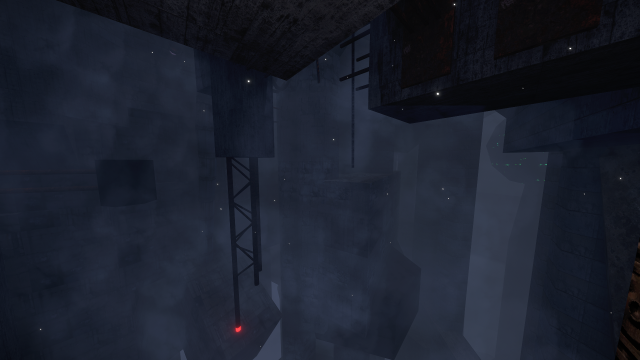[ad_1]
I’m not exactly sure what the original inspiration for the sparse but memorable collection of “games where you navigate an unimaginably large concrete structure” is, but I’m very happy they’re here. Drawing on “BLAME!” and early entries like NaisanceE, Rubeki Games’s Lorn’s Lure offers a sturdy new entry to this genre. The game follows your ice-pick-assisted pursuit of a digital ghost through massive, hour-long first-person platforming levels.
The concrete pillars, cat-walked towers, stone brick castles and walled-in dunes are the first thing you’ll see and for good reason. An immaculate attention to detail supports the incomprehensible scale imparted in a game like this. Every vista needs a subtle ceiling. Each hallway must feel both easy to traverse and incidental — a mere consequence of tectonic activity. I’m happy to report that Lorn’s Lure nearly always nails this. The game’s eight levels are diverse, each one centered around a visual motif that’s developed and subverted in equal parts. The second level covers your ascent, descent and then re-ascent of three towers, each jagged and messy but perfect for climbing. The surrounding area is thick with an orange atmosphere, and it looks different from each successive angle, first framed against the cavern’s ceiling, then against the open pit below. The visual atmosphere is lonely and haunted.
Setting and story go hand in hand here. Like many games in this subgenre, there isn’t much of an overarching plot, and that is a good thing. The silence serves to build both tension and comfort when applied correctly.
The gameplay draws from both boomer shooters and first-person speedrunning games like Neon White and Mirror’s Edge, albeit tuned down to maintain the scale and the mood. Moving slowly in a game like this is a good thing. Speed and size aren’t entirely interchangeable, but it lends those distant goals the gravity they deserve.
Throughout a playthrough, you’ll also collect new movement abilities that run the gamut from janky to excellent. The game’s emphasis on speedrunning is not to my tastes and subtracts a bit from the loneliness and weight of the game, but it only rarely punches through. For the most part, it is deliberate and slow as you identify the next foothold and puzzle out how best to make it there with your limited stamina.
Interestingly, the game also contains dispersed platforming challenge collectibles, which I have nothing kind to say about. They are distracting, unappealing and unnecessary. The gameplay kept me engaged throughout its entirety, and it certainly didn’t need collectibles to do it.
The problem that runs the deepest into the game is a slight, persistent mismatch between setting and play. It puts entirely too much energy into quality-of-life features, giving checkpoints after every jump and offering an optional but grating hovering waypoint indicator. Both of these reduce the impact of the harsh setting and fail to engender respect for the lovingly constructed environments. To work best, an inhuman superstructure demands the kind of level design which you barely know where you’re going. It should keep a bit of an edge to it — that “should I really be able to get up here” energy. That’s where Lorn’s Lure shines brightest, though I would have liked to have seen more of that exploratory feel centered in the game design over the collectibles and quality-of-life features.
However, the game has ingrained some moments into my mind, where a long tension buildup is contrasted with a thrilling moment of scale. Throughout the first level, the background is framed by distant green LEDs. They start as distant contrasts, inching closer and closer over 40 minutes of play. The lights grow larger in the distance; then, at the start of the level’s final section, you arrive to find out they are doors and windows, each taller than you are. It’s a tremendous build full of patience with an equally proportionate payoff, and I’m happy to say this game is full of these moments. Across the seven and a half hours it took to complete, I can think of about a dozen of these moments of breathtaking scale and beauty. While the gameplay doesn’t always feel completely connected to those realizations, the fact that the game keeps creating these moments is beautiful.
Though it undercuts its atmosphere in some minor ways, Lorn’s Lure is engaging, cohesive and occasionally breathtaking. It’s a triumph from a one-man development team, and absolutely worth the time.
Digital Culture Beat Editor Holly Tsch can be reached at htsch@umich.edu.
Related articles
[ad_2]
Source link











